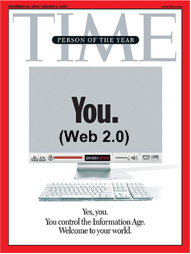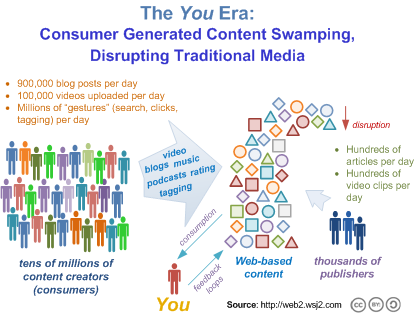Despite being considered so ten minutes ago in some corners of the the Internet, Time Magazine has selected Web 2.0 — in particular those people that are directly shaping it — as its esteemed Person of the Year. Specifically, Time Magazine has singled out you for recognition in this achievement and as the actual source of the exciting things happening on the Internet and in society today. Yes, that’s you, reading this right now. At least if you’ve been contributing to the Web in some way using the increasingly ubiquitous tools and technologies ranging from the basic blog or wiki all the way up to video sharing platforms and social bookmarking sites.
But the truth of the matter is that just about any interaction with the Web at all generates new content of use to someone else (the so-called Database of Intentions ) and so that means frankly, if you’re currently using the Web today even just to surf, you’ve become an integral part of this. “This” being a new generation of openness, sharing, and community powered by the Web that some think may be recognized in hindsight as breaking down important cultural barriers and institutions in a very similar fashion as what happened in the 1960’s. True, it often doesn’t seem like a revolution to us that see it growing bit and bit every day, but taken as a whole, there’s now little doubt that the Web has become the most powerful, egalitarian, and knowledge rich platform in human history. Rapid evolution appears to have accelerated into a sort of revolution.

The Person of the Year cover story appears with the tagline that “in 2006, the World Wide Web became a tool for bringing together the small contributions of millions of people and making them matter. The cover story’s lead author Lev Grossman then starts off with some fairly inspired prose after noting that there are still serious problems in the word which aregrowing in conjunction with this apparent technological Utopia, writing:
But look at 2006 through a different lens and you’ll see another story, one that isn’t about conflict or great men. It’s a story about community and collaboration on a scale never seen before. It’s about the cosmic compendium of knowledge Wikipedia and the million-channel people’s network YouTube and the online metropolis MySpace. It’s about the many wresting power from the few and helping one another for nothing and how that will not only change the world, but also change the way the world changes.
The cynical among us will find some of Lev’s analysis to be starry-eyed and excessively optimistic, but calling out Web 2.0 by name, the Person of the Year cover story makes careful note that the mass participation we’re witnessing on a grand scale on the Internet cuts both ways:
Sure, it’s a mistake to romanticize all this any more than is strictly necessary. Web 2.0 harnesses the stupidity of crowds as well as its wisdom. Some of the comments on YouTube make you weep for the future of humanity just for the spelling alone, never mind the obscenity and the naked hatred.
But the lead story is just the beginning and Time has prepared an extravaganza of supporting material and documention in the form of fourteen separate stories that range across the Web 2.0 terrain covering subjects from online virtual worlds such as Second Life to an article titled in near purple prose fashion: “The Beast With a Billion Eyes – On the Web, anyone with a digital camera has the power to change history.”
None of this however is likely to please most of us who have lived through the year of Web 2.0, as 2006 undoubtedly was its big break with the term making the covers of major media properties like Newsweek and The Economist . In terms of the blogosphere, the self-appointed contributors that are making some of this this happen, the commentary on Time’s choice covered the spectrum: Jeff Jarvis agreed with most of what they wrote, just requested that they turn down the volume a bit. Nick Carr took it surprisingly easy on the article, though he’s long since posted his opinions of the Web 2.0 phenomenon. Paul Kedrosky came in as one of harshest critics of the story series and accused it of being a blatent cop-out, what with more important issues existing elsewhere in the world needing to be highlighted. With this altter bit I would suggest that the printing press didn’t get much credit at the time but it’s impact was practically profound and beneficial when looking back several hundred years.
In reality, the Web as it exists today with sites like MySpace and YouTube which eagerly offer anyone who wants it an essentially permanent, scalable “channel” of their very own on the Internet, makes it possible for anyone with great — or at least interesting — ideas to reach the over 1 billion users that presently comprise the Web. Never before in history has access to the largest audience of users in the world been essentially free other than the personal time it takes to contribute. The long-term of effects of this will no doubt be as unpredictable as they will be significant as the control over information and content becomes relentlessly decentralized. The Web is essentially a system without an owner, a platform that is under no one’s control, though anyone is free to built a new platform on top of that. Companies have had varying success in doing just that but the design patterns and business models for making the Web work best are at least beginning to be understood (aka Web 2.0). But in the end, control is shifting to the edge of the Internet instead of the center and it’s not likely to shift direction without extremely potent motivation.

The aftershocks of all this (the shift of control, pervasive ability of anyone to trigger inflection points, etc) have sometimes been called Social Computing, and it will be long in unfolding. Companies and organizations that continually hand over more non-essential control to their employees, customers, and suppliers will almost certain be the big winners here. We have plenty of examples to cite already. The sudden pervasiveness of the two-way, participatory sites and tools powered by network effects and feedback loops have quickly remade the online landscape and Time has decided it is as big an event at least as it famously did in the 1980s by making the personal computer Person of the Year. I would wager however, the Web 2.0 is probably a more significant event by a good margin that even the PC was. Although the precise definition of Web 2.0 continues to evolve, the fundamental effect, the harnessing of collective intelligence is the one that has the genuine potential to fundamentally remake our cultures, societies, businesses and even, as Lev Grossman states, “change the way we change the world.
In any case, as usual, like the term or not, the Web is putting you in charge of just about anything that you can imagine. I recently spoke to a major fashion industry CEO who said he would expect to have product lines that were designed entirely by user contribution and the best resulting submissions selected by their customers to be that year’s product line. The lesson: The consumers have become the producers. The same with just about any line of business; turning over non-essential control can result in enormous gains in economic efficiency as tens of thousands or even millions of customers creative output is harnessed in a mutually beneficial way. Organizations that fail to embrace the Web’s natural communication-oriented strengths will fail when put in competition that those that do. Thus, a fascinating chain of events is forming as people around the world begin to realize the true significance of what the Web 2.0 era can truly offer. What will you do?
What do you think? Is Web 2.0 evolution or revolution? Why?
